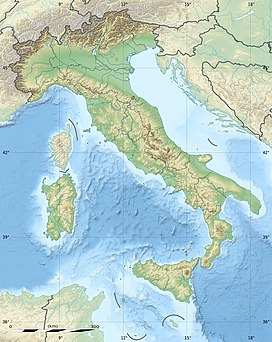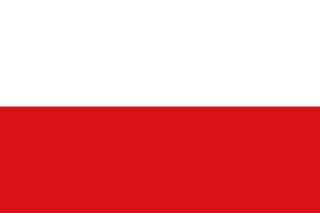
Tyrol is an Austrian federal state. It comprises the Austrian part of the historical Princely County of Tyrol. It is a constituent part of the present-day Euroregion Tyrol–South Tyrol–Trentino. The capital of Tyrol is Innsbruck.
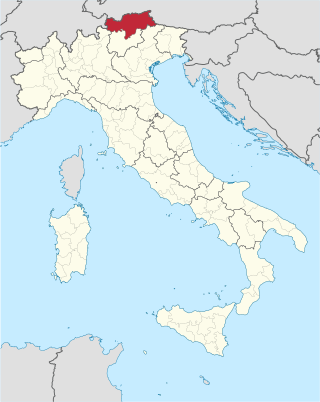
South Tyrol is an autonomous province in northern Italy. An English translation of the official German and Italian names could be the Autonomous Province of Bolzano – South Tyrol, reflecting the multilingualism and different naming conventions in the area. Together with Trentino, South Tyrol forms the autonomous region of Trentino-Alto Adige/Südtirol. The province is the northernmost of Italy, the second largest with an area of 7,400 square kilometres (2,857 sq mi), and has a total population of about 534,000 inhabitants as of 2021. Its capital and largest city is Bolzano.
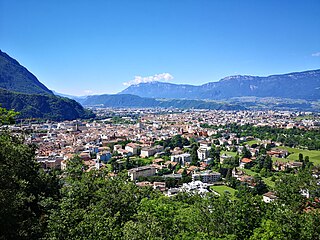
Bolzano is the capital city of the province of Bolzano - South Tyrol, in Northern Italy. With a population of 108,245, Bolzano is also by far the largest city in South Tyrol and the third largest in historical Tyrol. The greater metro area has about 250,000 inhabitants and is one of the urban centres within the Alps.

Trentino-Alto Adige/Südtirol is an autonomous region of Italy, located in the northern part of the country. The region has a population of 1.1 million, of whom 62% speak Italian as their mother tongue, 30% speak South Tyrolean German and several foreign languages are spoken by immigrant communities. Since the 1970s, most legislative and administrative powers have been transferred to the two self-governing provinces that make up the region: the province of Trento, commonly known as Trentino, and the province of Bolzano, commonly known as South Tyrol. In South Tyrol, German remains the sizeable majority language.
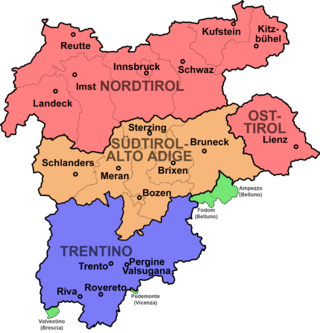
East Tyrol, occasionally East Tirol, is an exclave of the Austrian federal state of Tyrol, separated from North Tyrol by parts of Salzburg State and parts of Italian South Tyrol. It is coterminous with the administrative district (Bezirk) of Lienz.
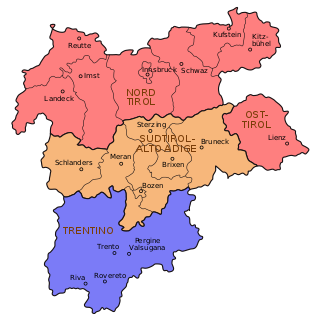
North Tyrol, rarely North Tirol, is the main part of the Austrian federal state Tyrol, located in the western part of the country. The other part of the federal state is East Tyrol, which also belongs to Austria, but doesn't share a border with North Tyrol.

The following is a list of municipalities of the autonomous province of South Tyrol, Italy. South Tyrol is divided into 116 such subdivisions. Both German and Italian are official languages in this province. Some municipalities have a third official language, Ladin. The capital of the province is in bold.

Modern-day South Tyrol, an autonomous Italian province created in 1948, was part of the Austro-Hungarian County of Tyrol until 1918. It was annexed by Italy following the defeat of the Central Powers in World War I. It has been part of a cross-border joint entity, the Euroregion Tyrol-South Tyrol-Trentino, since 2001.

The (Princely) County of Tyrol was an estate of the Holy Roman Empire established about 1140. After 1253, it was ruled by the House of Gorizia and from 1363 by the House of Habsburg. In 1804, the County of Tyrol, unified with the secularised prince-bishoprics of Trent and Brixen, became a crown land of the Austrian Empire. From 1867, it was a Cisleithanian crown land of Austria-Hungary.

Hafling is an Italian comune (municipality) and a village in South Tyrol in Italy about 20 kilometres (12 mi) northwest of Bolzano and high above the valley basin of Merano.

Laives is a town and a comune (municipality) in South Tyrol in northern Italy, located about 8 kilometres (5 mi) south of the city of Bolzano. It is one of only five mainly Italian speaking municipalities in South Tyrol, and the fourth largest municipality in the province.

Salorno sulla Strada del Vino is the southernmost comune (municipality) and a village in South Tyrol in northern Italy, located about 30 kilometres (19 mi) southwest of the city of Bolzano. It is one of only five mainly Italian-speaking municipalities in South Tyrol.
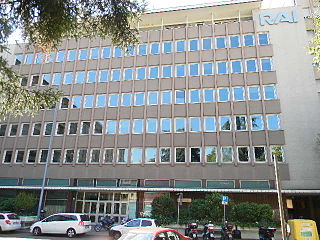
Rai Südtirol is a German language radio station produced by the Italian public-service broadcasting network RAI from its studios in Bolzano. The station programming is aimed to the German-speaking listeners in South Tyrol.

In 1919, at the time of its annexation, the middle part of the County of Tyrol which is today called South Tyrol was inhabited by almost 90% German speakers. Under the 1939 South Tyrol Option Agreement, Adolf Hitler and Benito Mussolini determined the status of the German and Ladin (Rhaeto-Romanic) ethnic groups living in the region. They could emigrate to Germany, or stay in Italy and accept their complete Italianization. As a consequence of this, the society of South Tyrol was deeply riven. Those who wanted to stay, the so-called Dableiber, were condemned as traitors while those who left (Optanten) were defamed as Nazis. Because of the outbreak of World War II, this agreement was never fully implemented. Illegal Katakombenschulen were set up to teach children the German language.

The Tyrol–South Tyrol–Trentino Euroregion is a Euroregion formed by three different regional authorities in Austria and Italy: the Austrian state of Tyrol and the Italian autonomous provinces of South Tyrol and Trentino.

The South Tyrol Alpine Club, abbreviated AVS, is an association of German and Ladin-speaking mountain climbers in South Tyrol, northern Italy. Founded in 1946, it is subdivided into 36 sections and 58 local divisions. The AVS is based in Bolzano and has more than 76,000 members.

The Pragser Wildsee, or Lake Prags, Lake Braies is a natural lake in the Prags Dolomites in South Tyrol, Italy. It belongs to the municipality of Prags which is located in the Prags Valley.

Tyrol is a historical region in the Alps of Northern Italy and western Austria. The area was historically the core of the County of Tyrol, part of the Holy Roman Empire, Austrian Empire and Austria-Hungary, from its formation in the 12th century until 1919. In 1919, following World War I and the dissolution of Austria-Hungary, it was divided into two modern administrative parts through the Treaty of Saint-Germain-en-Laye:
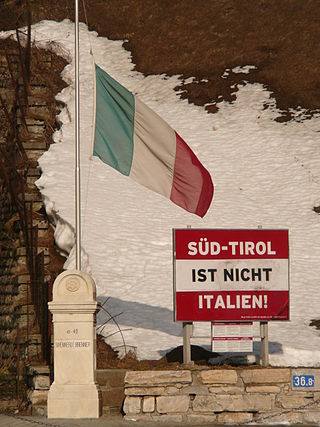
The South Tyrolean independence movement is a political movement in the Italian autonomous province of South Tyrol that calls for the secession of the region from Italy and its reunification with the State of Tyrol, Austria. Concurrently, some groups favor the establishment of an interim Free State of South Tyrol as a sovereign nation while reintegration is organized.
The Savings Bank of the Province of Bolzano / South Tyrol is an Italian savings bank based in Bolzano, the capital of South Tyrol autonomous region.

